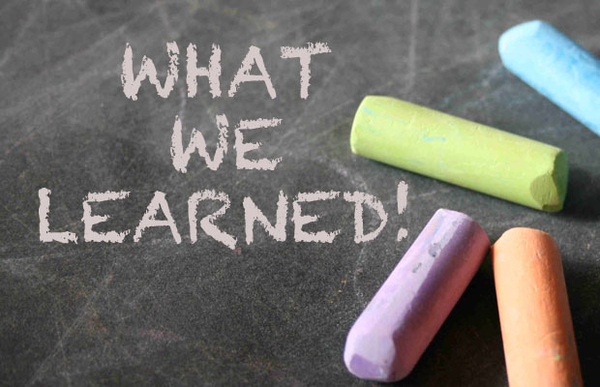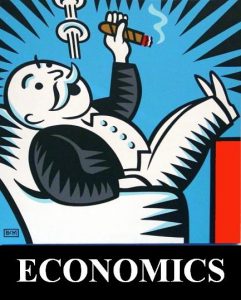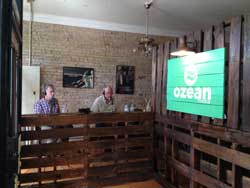
by Alex Patton | Jul 22, 2013 | Political Media
I am bummed. The failure of our attempt to save Talk of the Town kicked me right in the gut. We lost money, time, and ego, and if you know anything about me, you know that I don’t take losing easily. Losing hurts, and I admit upfront that I am a horrible loser.
I have spent my time reflecting constructively – riding my bike 100 miles, running over 10, and swimming over three in the past 5 days in an effort to process failure.
Like many “start ups” in the postmortem phase, one dissects the situation in an effort to learn from it, and I seem to do this best while exercising.
Here is what we have learned from the demise of Talk of the Town:
Where we failed
We were horribly under-capitalized for this endeavor. In fact, we were non-capitalized for this endeavor. Never do that again.
We were unable to attract commercial advertisers for the show. The advertisement package consisted of in-show reads & spots, website advertising, email newsletter advertising, and newspaper print advertising. Not one business bought in the time frame we needed. We realized that we would have to attract believers in the show willing to take this leap of faith with the show’s mission, and in the end we were unsuccessful.
The simple economics of the show:
Hard Costs
Equipment: $659.12
Internet: $125 month (we needed a robust upstream to broadcast the show)
Software: $1,000 in one time cost.
Software: $5,000 ($399 per month for streaming for 12 months) This was for third party streaming and mobile application licensing fees. Interesting Fact: Talk of the Town became Live365’s #12 ranked talk show in a matter of 6 weeks.
Board Operator: $10 per hour for 2.5 hours a day. 4/5 weeks per month $500/$625 for a month
Website hosting: $49-$65 per month depending on bandwidth used. Streaming requires more bandwidth than other websites.
Sales Commission: a percentage of sales & automobile mileage
In-kind Contributions:
Talent/Diva Fees: $600 to $750 per month depending on 4 or 5 weeks per month
Website development: $2,500 & $250 per month for maintenance and changes
Construction of Studio: approximate value: $5,000 of time of three people
Equipment: $1,500 (we were able to get some equip. donated from third parties)
Ozean Equipment & Expenses: $10,000 (Ozean’s existing computers, hardware, software, office, electricity, etc)
Bottom Line
We were on pace to raise about half of what we needed to cover just ongoing operating costs, let alone get to a level to compensate talent or upgrade equipment in order to move from a patchwork system to a more professional set up.

Things learned
Jake and Ward love this community – A LOT.
What many may not realize is that these two worked without compensation and even passed on other financial opportunities to continue the show. Not only that, but they cared so much that they were willing to take the slings and arrows that came with speaking out. They took the bullets so that the rest of us didn’t have to. When people talked of “toxic hate” radio (when they really meant the expression of a different opinion) they weren’t speaking of us. Ward and Jake stood there like men and took it all in order for our community to hear a different opinion.
Economic Models
Local advertisers have not embraced an Internet model of advertising. With limited advertisement dollars available, they choose to spend their money elsewhere. I think they are wrong, but I understand.
Competing Interests
Some didn’t like the Internet, digital model and were working on a plan to purchase a small radio station. When trying something new, it doesn’t help when supporters of the show implicitly signal they don’t believe in its form. But, I understand that is business.
We horribly overestimated people’s desire to financially support the show
This is the one I am most disappointed in myself for, because I know better. I spent years in fundraising for political campaigns at the Congressional level. I know the drill. “You have my support – call me.” Then we spend the next three weeks calling with no answer. DAMN IT, I know better than to trust people’s good intentions, but in my thrust to get the project off the ground, I ignored the voice.
Some on the extreme-right blackballed the show
Went there.
Some on the left blackballed the show
Yep, went there too. From Commissioner Bottcher requesting lists of advertisers to PIO officers warning businesses “not to tarnish their image”, there was a concentrated effort to kill the show.
It was me personally
Some people refused to be affiliated with the show financially because I personally was involved in the show. Shame, it is well known that I had my disagreements with the show – in fact we had some of them on the air. Yet, I realized the over-all good the show was doing, and I was willing to set aside any petty, lingering feelings to help save the voice of the loyal opposition. Shame others couldn’t do it.
Enterprise doesn’t run on appreciation – Or – There are hypocrites among us
Funny, the same people who called the show the most talking of their ‘deep appreciation for the show’ and lamenting the loudest about the show’s demise, never would be bothered to donate $15 per month. In fact, they wouldn’t donate a dime in any form – one time donation, monthly, etc.
In fact a vast majority of the donations received to keep Talk of the Town going were from small donors with limited means – THEIR $15 a month meant a lot.
I would rather someone had said honestly “This Internet stuff won’t work and I am not giving you a dime.” than call the show every other day talking about their appreciation and praising the wonder of Talk of the Town while sitting on their fat wallets.
People listen to Streaming Media
Funny, some of the same people that were the most adverse to the Internet streaming saying or emailing such silly things as “all my friends don’t use the Internet” were some of the most consistent listeners.
What to do differently
In retrospect, what I would have done differently was to advised Ward & Jake NOT to launch the show immediately. I would have advised a period where the show went dark, and we used this time to launch a “Save the Talk of the Town” campaign. We would have collected pledges and only when we raised $x would we have continued with the launch. In fact, Talk of the Town sounds like a perfect kickstarter project.
That process would have saved time, money and fleshed out the scoundrels earlier.
Talk of the Town Conclusion
In the end, while disappointed and a bit bruised by the failure, I am not bitter. I will get over it and move on (may take another 50 miles on the bike). We learned a lot from the experience and collected very interesting data about Internet streaming.
In the end, I hope the show or something similar to it is re-born, because as all political scientists & practitioners know “when the political elites agree with no countervailing opinion, consensus is assumed.”
And at this point, there is no one left to stand guard.

by Alex Patton | Jul 16, 2013 | Political Consulting, Political Media, Political Research
I am asked all the time, what makes a good candidate?
While we all know a great candidate can get beat when the political environment and/or district are not in his/her favor or at least even, we will set this aside.
We will just look at the simple question, “What makes a good/great candidate?”

The Secret Sauce
The ability to craft and tell a coherent story that emotionally connects with voters. There it is – that is the secret sauce.
While all political consultants are all excited about the latest scientific studies, big data, predictive analysis, and changes in media consumption, it still comes back to the basic building block of good ol’ fashion storytelling.
It begins with the Story
Before we write campaign plans, strategies, tactics, we need the story to tell.
When we first meet with a candidate, we ask them the basic question: “Please, why you are running?”
If the candidate tells me that they are going to run an “issue-orientated” campaign and proceeds to rattle off 10 issues with solutions and facts, we know that we have a ton of work to do or that we should focus on other candidates.
What we really want to hear is: “Thanks for asking Alex, you handsome devil, please allow me to tell you a story…..”
I dream to hear a candidate tell a story connecting with the values and emotions of most of the voters AND contains BOTH protagonists and antagonists.
 We need a story that defines who they are and what they stand for, and a critical element of the story is that it will be rejected by 20-30% of the voters.
We need a story that defines who they are and what they stand for, and a critical element of the story is that it will be rejected by 20-30% of the voters.
If they tell us a story that attempts to attract 100% of the vote and never offends anyone, we want out or a really weak field. Without conflict, there is no story! Yes, the tone is up for discussion, but we must have conflict.
The dream candidate? The dream candidate can make the difficult transition of constructing the story without themselves as the central character. However, in the beginning, we will just take a story, any story.
Why? This is not because I think it works.
It is science.
The Science of Story
Our brains need stories. In fact, our brains actively search for stories, and when our brains have difficulty, our brains will just make stuff up to fill in the gaps.
It appears from all the research, our feeble brains must have stories to construct neat, little packages so that we can retain & understand. It is why we have listened to and told stories since we were children, it is why Hollywood exists.
If I could, I would require the following reading list for candidates to include but not limited to:
- McKee, Robert. Story: Substance, Structure, Style, and the Principles of Screenwriting. HarperCollins Publishers, 1997.
- Mark, Margaret, and Carol S. Pearson. The Hero and the Outlaw: Building Extraordinary Brands Through the Power of Archetypes. New York: McGraw-Hill, 2001.
- Sachs, Jonah (2012-06-19). Winning the Story Wars: Why Those Who Tell (and Live) the Best Stories Will Rule the Future Harvard Business Review Press.
Summary of the Importance of Political Stories
I concede, it is probably asking too much to have candidates – especially first time candidates – approach campaigns with fully crafted stories.
However, instead of jumping right to numbers and strategies, political consultants need to spend more time upfront convincing our clients the importance of storytelling and then working with them developing their story.

by Alex Patton | Jul 12, 2013 | Political Consulting, Political Research
Science Friday: Why negative campaigning works! An Overview
As political consultants, we catch TONS of blow-back for negative campaigning. 
However, when we are asked why we engage in negative campaigning, we don’t do ourselves any favors by flippant remarks such as “Well, negative campaigning just works!”
As professionals, we all know it just works. We know it intuitively, we have been taught it by mentors’ rules of thumb, and we have seen the numbers tank 20 points when an explosive direct mail piece / issue hits. We have the war stories.
We also know that we can pump out positive, fluff bio pieces by the truckloads and not interest the press one darn bit. However, we send out one, small universe hit piece and the press goes NUTS!
However, let’s not just blame the press or just retort “It just works”.
Instead, let’s take a moment to explore the real culprit : the human mind.
Yep, it’s your brains’ fault that negative campaigning works.
It is your brain’s fault!
Principle #1 : Bad Interactions have stronger, more pervasive, and longer lasting effects.
In a 2001 study by Roy Baumeister, Ellen Bratslavsky and Catrin Finkenauer “Bad is Stronger Than Good”, the results are clear! In their conclusion, “It appears to be a basic, pervasive fact of psychology that bad is stronger than good.”
The study performs a comprehensive review of different literature of “bad versus good” It reviews everything from evolution to psychology to communication to relationships to emotions and moods to rewards and punishment to how we process information.
In fact, when speaking of processing information:
“Thus bad information does receive more thorough information processing than good information. Bad information is more likely to seize attention, and it receives more conscious processing as well.”
It does not matter where you look, the human mind is wired – “Bad interactions have stronger, more pervasive, and longer lasting effects.” PERIOD!
Read the complete study: Bad is Stonger Than Good
Principle #2: Loss Aversion – Losses loom larger than gains.
Human brains are wired to be loss averse, by a large margin. When faced with potential losses, our brains become totally irrational and develop a blind spot … by a large spread. 
“The “loss aversion ratio” has been estimated in several experiments and is usually in the range of 1.5 to 2.5.” Kahneman, Daniel (2011-10-25). Thinking, Fast and Slow (p. 284).
Essentially, the human responses to loss is stronger than the response to corresponding gains. This is commonly referred to as prospect theory, and this concept changeds Economics and how we think of human decision making.
Further suggested reading: Thinking Fast and Slow by Daniel Kahneman (it really is an almost must read)
Conclusion
In summary, our brains are wired to remember the bad. It appears to an evolution trait developed so that we may live: remember the bad tiger and survive the threat – OR – remember the good smelling flower and get eaten by the tiger.
In summary, we also know that if we can make you fearful of losing something, we can awaken emotions in your brain that you didn’t know you had.
In this cluttered, busy and fast moving world, is it any wonder of what breaks through?
We can motivate your brain with bad, scary information, and it is cheaper to do so.
However, it ain’t political consultants’ fault! It is your brain’s fault!
The next time your neighbor or the press goes crazy about a negative piece do not reply “It just works”.
Instead tell them why it works:
“It’s your brain’s fault – your brain remembers & thinks about bad stuff more and your brain is loss averse by a 2:1 margin. Change your brain, and I will change my campaign tactics.”

by Alex Patton | Jun 19, 2013 | Political Consulting
There has been a trend towards political pundits using the term “low information voters”; however, I am growing greatly concerned with the misuse of this term.
Low Information Voter
Low information voters, also known as LIVs or misinformation voters, are people who may vote, but who are generally poorly informed about politics. (Wikipedia)
I have heard this term used by many of talk show hosts, and frankly, they are misusing it or they don’t understand it.
This misuse of this term is going to have profound long-term and strategic down stream effects, if we don’t change course.
What is wrong with the term ‘Low Information Voter’? Simply, the misuse of the term promotes a wrong archetype of a voter.
This term creates a archetype of a ‘low information voter’ bumping around in the wilderness, stupid, and uneducated. This voter, if only educated with facts and figures, will suddenly wake up from their slumber, see the light, and become engaged voters.
This image, stereotype or archetype could not be further from the truth.
Rationally Ignorant Voters
I prefer the term Rationally Ignorant Voters (Downs) because I think this is a much better archetype. Only by understanding the ‘Rationally Ignorant Voter’ archetype can we develop proper communication strategies.
The difference? Rationally Ignorant Voters have made a decision either consciously or unconsciously not to invest their time and energy in politics. When weighed against everything else going on in their lives, politics is not worthy of the investment of increasing their political knowledge.
These voters are choosing to spend time elsewhere in places they find more valuable.
The archetype is NOT someone bumping along aimlessly lost in a forest. This voter can be a highly educated person, civic minded, grounded in principles and values, but for whatever personal reasons, just doesn’t care that much about politics. Or if they care, it is 28th on the list of things they care about.
 The ‘Rationally Ignorant Voter’ is my beautiful, loving, and incredible wife.
The ‘Rationally Ignorant Voter’ is my beautiful, loving, and incredible wife.
Before the negative emails begin, I love my wife and she is far from ‘ignorant’; however, she is what I would consider a Rationally Ignorant Voter. I could also use my mother, my friends, or even the CEO of a start up I know, but I like living dangerously.
A few notes about my loving, beautiful, awesome wife: She has a graduate degree, works full time. She is an incredible mother of a 10 year old son and a 7 year old daughter. She is an fantastic wife to a man that acts like he is a teenager a lot of the time. She keeps one helluva clean house, coordinates schedules to get kids to Tae Kwon Do and ballet, etc. She has managed to harness chaos and have energy left over. She is the modern woman.
She is very interested in certain topics that are in the political world – mental health issues, child protection. However, past those issues, she is making a decision NOT to invest any additional time in politics. She thinks the rest of us are nuts.
Now, I live, breathe, eat politics and this practice blows my mind. However, when she starts talking to me about esoteric new treatment plans for x mental disorder, I suddenly understand. With everything going on in my life, I just can’t put that much energy into the DSM-IV.
What to do?
Understanding the difference in the two archetypes is essential to understanding how to communicate with these voters.
What the ‘Low Information Voter’ crowd is getting wrong is they think education with facts, figures, and stats are suddenly going to make a light go off.
WRONG.
You can throw all the education at my love wife you like, but just because you care about something doesn’t mean she will.
When you understand the Rationally Ignorant Voter archetype, you understand it is not facts and figures, it is caring.
It is NOT the rational side of the brain you have to activate.
It is the emotional side of the brain one must activate to get the attention of these voters.
Remember, they have made a decision NOT to invest time and energy in politics because it is a low priority in their everyday lives, and until you make them want to invest more time by triggering the emotional center of their brains , you will not break through.
To communicate with these voters, you must understand the values of my wife and communicate with her through these.
That is not done with boring “education”, it is done with contrast & conflict but that is another post.
But before that, please don’t believe that the simplistic “Low Information Voters” label is correct. It is wrong, misleading, and much more complicated.

by Alex Patton | Jun 5, 2013 | Ozean Media, Political Media

A good friend of mine made a comment that has stuck with me over the past few days “The Internet moves at the speed of Imagination!”
That statement remained with me over the past 3 days as we designed, built, and tested (I use those words VERY loosely) a complete broadcast studio in our office.
How it all began
There is a local radio station that featured a conservative radio talk show, Talk of the Town. The show was a live call in show broadcast M-F 11am – 1pm. As with a lot of media, there is a move towards consolidation and ownership changes. Last Friday, the ownership of the station changed, and as with any new owners, their vision for the station differed from hosting a local, call in talk show. On Friday, the station changed its format to High Energy Dance music bringing a little Jersey Shore to our local town.
At the same time, our single local paper announced they were putting up a digital pay-wall for their news content. Again, their right to do so.
Immediately upon hearing of the cancellation of the talk show, Ozean approached the show hosts with an idea:
In this media chaos, there is an opportunity. We can create a digital station that will focus on hyper-local coverage and build an online community around it. And yes, we can have you back on the air by Monday.
The scramble begins
A secret? As with many things on the Internet, we had no budget and no specific idea how to actually do this. We knew it could be done, but the how….
We just remained focused on producing the Minimum Viable Product – we wanted a live broadcast with live call ins with the ability for people to listen in a web portal or mobile app. Piece of cake, right?
Here is a rough timeline with the snags we worked through (some of the details may be fuzzy due to sleep deprivation….)
FRIDAY
Step 1) Find a third party partner who could accept our live stream and push it to pre-made mobile apps. This is the critical piece.
SNAG: The provider is located in California with one sales person who was telling me that they couldn’t have me on by Monday (it was too technically challenging and we would most likely crash and burn.) I politely insisted he take my credit card and take my money. The sales man finally relented, and I stopped at a Starbucks and executed the contract online. In a triage situation, this was the airway.
Step 2) Build out a quick website. Cobbled a quick website together using WordPress. It is not the prettiest site nor is it totally built out, but not bad for 5 hours and 2am in the morning. Alachuatalks.com
Step 3) Cobble together software to broadcast and test connection. Tested multiple software packages and vendors.
SNAG: Our chosen provider’s software works only works on a PC. DARN IT everything is set up to go through a Mac. Spending about 3 hours on forums and google searches, we find an alternative piece of software, download trial and configure.
SNAG: For the life of me, could not get a connection made. I suspected that I was not opening a firewall port correctly. Called in reinforcements. A network expert, Stafford Jones, and he remotely dialed into our computer and diagnosed issue and fixed it. We were now connected to a test server.
Step 4) Build out additional web pages and functions. Install analytics at 9 pm. Post a couple social media posts about the show pointing to the new site. I am embarrassed of the sites appearance. Real time results show there is interest in the new website. Encouraging. Pass out.
Step 5) Wake up an hour later – forgot to place a place to capture email addresses on the site. Set up Mailchimp list, build widget, insert crudely into the website making it even more ugly. Sleep again.
SATURDAY
Step 6) New equipment. We needed new mics, a mixer, a way to digitize, connectors to get it all into a computer and broadcast.
SNAG: Of course we could find all the equipment we needed online, but we needed it Saturday, not in 2 -days shipping time. Asked a friend if he had a spare mixer laying around? He did! Then looked in a spare closet for old equipment we already owned that may work. Found a piece that MAY WORK! Drove to a local music store (Lipham Music) and told them what I was attempting to do. They shared their expertise and we cobbled a system together. True, it is not optimal, but it MAY work.
Step 7) Opening, plugging in and testing. Started cobbling together all this different equipment from different eras, praying it all somehow worked.
SNAG: My daughter has a dance recital on Sunday, and because I am going for the dad of the year award, we had Daddy Daughter dance rehearsal on Saturday 9am.
Step 8) Returned from dance recital practice and test cobbled together mics and returns.
SNAG: Mics are working, Returns are not working. Set this aside until later and make note to call my friend who owns the mixer so that he can help me. (He later looks at a photo of the mixer online and tells me what knobs to turn. BOOM! Working!)
Step 9) Ability to take call ins.
SNAG: We have a VOIP system in our office and I didn’t want to use my regular business phone for a call in number. When attempting to purchase a new number and configure our Asterisk server to route the number to a phone, I suddenly remembered that we have a phone number with our internet provider that we never use. We don’t even have a phone line attached to it.
SNAG: Because, we only have VOIP phones, I don’t know if that phone line works. We need a cheap $9 phone and an old analog phone cord.
SNAG: We need a specialized piece of equipment that can splice in phone calls and allow the hosts to interact with the caller. Called my network friend, Satfford, again. We agree to work on it on Sunday.
SUNDAY

Cobbled together studio
Step 10) Major Issue: Solve the call-in problem.
SNAG: Daughter’s dance recital is today – this means Dress rehearsal at 1:55pm and recital at 6pm. Put call-in issue off for now.
Step 11) Test mobile connection. Call one of the hosts, walk him through install of mobile app and test broadcast on his I-phone. BOOM! He downloaded mobile app and could hear me broadcasting. Partial success. (didn’t mention the call in issue)
Step 12) Dress rehearsal. Pick up daughter, head to Performing Arts Center for a 15 minutes rehearsal. Take her home head back to office.
Step 13) Meet gracious friend, Stafford Jones, at the office. Plug in cheap phone. DIAL TONE. Now, how do we get this to work with the other stuff? Our first set up got the audio from the phone to the broadcast, but the callers wouldn’t hear the hosts. We started cutting wires splicing it together, destroying some headsets and phones along the way. Tired. Went home Sunday night not knowing how we were going to get this critical part to work, but had an idea of what may work.
Step 14) Dance recital. 6pm.
Step 15) Panic. How am I going to get the call ins to work?
Step 16) Exhausted and worried that we are heading for a disaster remember that I have to send out instructions to people on how to listen to the show. Compose and send an email blast to people who had signed up for the email list. Erase the words, “If we broadcast…..” from the email several times.
MONDAY
Step 17) Visit Super Wal-mart at 6:30 am. They have ONE speakerphone on the shelf and a 50 foot cord. My bright solution? Literally going to put a mic on a speaker phone – WOW is that awful and very low-tech for such a digital endeavor. But for now, it just may work.
Step 18) Set up speaker phone.
SNAG: Phone needs 4AA batteries. Can’t find them. Run to CVS, purchase batteries, 1 hour until go live time.
Step 19) Test broadcast
SNAG: It FAILS. Looks like our provider did maintenance over the weekend and the port that we need opened has changed. PANIC. Log on and follow the pattern set by my friend, open a new port.
Step 20) Talk show guests arrived and this is the first time we check mic levels, and test broadcasting. With the new port, it seems to work. Success!

Step 21) Quick – test mobile app. Success!
Step 22) Say a quick prayer, FLIP SWITCH AT 11 AM….and we are broadcasting.
SNAG: Within 10 minutes, due to overwhelming demand, web server crashes.
Step 23) Act as tech support- helping listeners tune in the broadcast with a server crashing. Re-route traffic.
Not everyone who want to hear, could hear, but some did.
Again, while not optimal, there was demand and the MVP worked….barely. We live to tomorrow and clearly defined the words ‘minimal viable’.

The Point
The point was not to paint a scenario that mirrors the ending chaos from GoodFella’s, but to show how fast the Internet moves…..as my friend said – at the speed of Imagination.
Our “broadcast studio” is far from perfect or optimal, but for right now, the show is broadcasting.
We are working to get a little better each day. As an illustration, spent the very first day upgrading server to allow for additional web traffic, and on the second day, the server did not crash.
What have we learned
Because we could do it, doesn’t mean we should. Focus on the Minimum Viable Product, nothing more.
There is a demand for this product. Now we can look to bring in revenue to build a better product once we analyze the data to see what & how people are actually using.
But first, I need a nap.
Press Coverage of AlachuaTalks
Here is a story, WCJB did on the show.
Finally, here is how to tune into Alachuatalks and listen.
















